|
|
|
Sort Order |
|
|
|
Items / Page
|
|
|
|
|
|
|
| Srl | Item |
| 1 |
ID:
086664
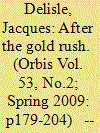

|
|
|
|
|
| Publication |
2009.
|
| Summary/Abstract |
Four months after the Beijing Olympics, on the vast plaza beside the games main venues, workers fought gusty winds and freezing temeratures to erect, incongruously, scores of artificial Chistmas trees while a handful of hawkers futilely pushed discounted memorabilia.
|
|
|
|
|
|
|
|
|
|
|
|
|
|
|
|
| 2 |
ID:
188138
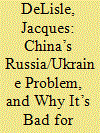

|
|
|
|
|
| Summary/Abstract |
The war in Ukraine, the international responses targeting Russia, and China’s reaction to the conflict point to complex and possibly growing China-related challenges for international order and security, especially in the Indo-Pacific region. On issues of great power diplomacy, state sovereignty, economic sanctions, and the use of military force, the lessons Beijing’s behavior appears to teach and the lessons Beijing may be learning in the context of the Ukraine crisis are complex but mostly bode ill. These Ukraine-related developments are greater causes for concern because they are consistent with, and likely to reinforce, prior trends and patterns in China’s perceptions and behavior.
|
|
|
|
|
|
|
|
|
|
|
|
|
|
|
|
| 3 |
ID:
173869
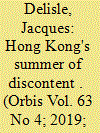

|
|
|
| 4 |
ID:
151414
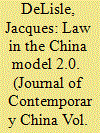

|
|
|
|
|
| Summary/Abstract |
The Xi Jinping era version of a China model of development continues law’s reform-era roles of generally market-oriented development (under newly challenging conditions), checking development-challenging threats (amid increased concerns over corruption) and reducing pressure for political change (at a time of intolerance toward dissent). The Xi-era version of law appears to be more ‘legalist’ (than its predecessor), still ‘reformist-developmentalist’ and more ‘Leninist’. The Xi-era project for law remains narrowly instrumentalist, uneven across subject matter and region, and beset by both ‘supply-side’ and ‘demand-side’ challenges.
|
|
|
|
|
|
|
|
|
|
|
|
|
|
|
|
| 5 |
ID:
101775
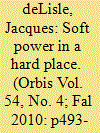

|
|
|
|
|
| Publication |
2010.
|
| Summary/Abstract |
Soft power, like so much else in relations between the People's Republic of China and Taiwan, is asymmetrical and freighted with implications for U.S. policy and U.S.-China relations. For China, soft power largely serves-or strives-to reduce alarm (or at least reaction) among other states concerned about China's new-found hard power or, perhaps more realistically, the hard power that China's economic rise can underwrite. Much of the value for Beijing of soft power is-and is likely to remain for quite some time-its potential contribution to reducing the likelihood that other states will react to China's rising hard power in ways that could threaten China's interests.
|
|
|
|
|
|
|
|
|
|
|
|
|
|
|
|
| 6 |
ID:
148092
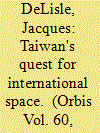

|
|
|
|
|
| Summary/Abstract |
Taiwan's “international space” has been a vital concern for the nation's leaders, and increasingly so as China has grown in power, influence, and ability to “squeeze” Taiwan's international space and thereby undermine the international stature that matters for Taiwan's security. President Tsai Ing-wen inherits a legacy of multi-pronged efforts and some successes, and will seek to build on them as she pursues her own distinctive approach. But she must do so in the face of continuing, and possibly increasing, resistance from Beijing and amid uncertainty about the policies of key states, including China and the United States.
|
|
|
|
|
|
|
|
|
|
|
|
|
|
|
|
| 7 |
ID:
118305
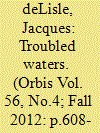

|
|
|
|
|
| Publication |
2012.
|
| Summary/Abstract |
Among China's unresolved frontier questions, the South China Sea has become the most complex and troubled, and arguably the most significant and disconcerting. The economic and security stakes are high and the stake-holding states numerous and diverse. The claims that China (and others) make about the region reflect such interests but they are, ultimately, legal claims. Beijing's assertions of rights to the disputed areas have rested on three conceptually distinct grounds. Each presents a different mix of challenge and accommodation to international legal norms and the interests of other states, including China's neighbors, near-neighbors and the United States.
while China's behavior (as well as that of other interested states) has been more and less assertive at various times, China's three basic arguments claiming rights to the region have been comparatively stable. Both China's pattern of multiple legal arguments and fluctuating actions and rhetoric do little to resolve the debate over whether a rising China will be deeply disruptive of the regional and international order or whether it can-with sufficient skill and tolerable adjustments-be accommodated and integrated. Although China's stance on rights in the South China Sea may be partly the accidental product of conflicting agendas and shifting assessments, Beijing's embrace of three distinct lines of legal argument arguably constitutes a strategy that serves China's interests given the factual, legal and strategic environment that China faces.
|
|
|
|
|
|
|
|
|
|
|
|
|
|
|
|
| 8 |
ID:
160776
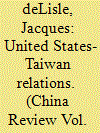

|
|
|
|
|
| Summary/Abstract |
With Tsai's coming to power several factors portended continuity in the strong U.S.-Taiwan relationship that she inherited. Washington welcomed Tsai's approach of pledging to maintain the status quo in cross-Strait ties. In U.S. policy on cross-Strait issues, the "clarity of strategic ambiguity" endures: Washington assesses which side is to blame for any deterioration in cross-Strait relations, and favors, at least at the margin, the other party. With Tsai, Washington sees Beijing as primarily at fault, in that Washington perceives Tsai as having gone as far as she can (given political constraints), and Beijing as being too demanding. Although Trump administration policies and actions—specific ones concerning Taiwan and broader ones with implications for U.S.-Taiwan relations—and an approach to foreign policy characterized by volatility, a transactional mindset, and institutional fragmentation introduced significant uncertainty, persisting features of U.S. policy toward Taiwan and cross-Strait issues limit the likelihood of change in Washington's approach to relations with Taiwan: the durability of strategic ambiguity, the classic alliance dilemma of abandonment versus entrapment, the persistence of Realist, interest-based analysis that weighs against "abandoning Taiwan" during a long period of more adversarial U.S.-China relations, the likely durability of the "values" strain in U.S. foreign policy (despite Trump), the entrenched nature of the Three Communiqués and the Taiwan Relations Act (TRA), a substantial congressional role in the stewardship of U.S.-Taiwan relations, and the tendency of U.S. policy on Taiwan and cross-Strait issues to be primarily reactive to choices made in Beijing and Taipei.
|
|
|
|
|
|
|
|
|
|
|
|
|
|
|
|
| 9 |
ID:
160775
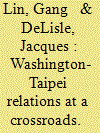

|
|
|
|
|
| Summary/Abstract |
Elections of new leaders in Taiwan and the United States in 2016—and, less dramatically, the 19th National Congress of the Chinese Communist Party (CCP) and the 2017 session of the National People's Congress in China—have changed the domestic landscapes that shape U.S.-Taiwan relations. The two elections brought to office leaders who are significantly different from their opposite party predecessors. In Taiwan, voters selected Tsai Ing-wen (蔡英文), the candidate of the traditionally pro-independence Democratic Progressive Party (DPP), which last held power during 2000–2008—a period of chronic tension and occasional crises in cross-Strait relations. In the United States, Donald Trump came to office with palpable disdain for Washington's established ways and with a foreign policy and national security policy team that was sparse, unconventional, and strikingly thin in experience and expertise in Taiwan and cross-Strait policies. The approach of the first Party Congress heldfully [End Page 1] under Xi Jinping's leadership had triggered much speculation about possible changes in cross-Strait policy although, in the end, adjustments were limited to a marginally tougher line toward Taiwan (as well as striking indications of Xi's consolidation of power), but no major changes in Beijing's approach to cross-Strait issues.
|
|
|
|
|
|
|
|
|
|
|
|
|
|
|
|
| 10 |
ID:
181715
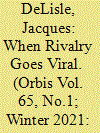

|
|
|
|
|
| Summary/Abstract |
Regional security and regional order in East Asia are shaped profoundly by the United States, the People's Republic of China, and U.S.-China relations. The COVID-19 crisis accelerated a negative trajectory in the relationship between Washington and Beijing. As with so many issues, here, too, the situation in the time of COVID is much like the status quo ante, only more so. The pandemic-related and pandemic-exacerbated problems in U.S.-China relations pose challenges for security and stability in East Asia. They do so in ways that several theories of international relations would predict. This is the first of a two-part series, the latter of which will appear in an upcoming issue of Orbis.
|
|
|
|
|
|
|
|
|
|
|
|
|
|
|
|
| 11 |
ID:
182882


|
|
|
|
|
| Summary/Abstract |
The United States, the People’s Republic of China, and the U.S.-China
relationship greatly affect security and the regional order in East Asia. The COVID-19
crisis has sharpened a downward trend in relations between Washington and Beijing. The
effects are consistent with what theories of international relations would predict, based on
fundamental features of U.S.-China relations and the two countries’ positions in the regional
and international orders. The first article in this two-part series focused on several aspects of
these issues that are relatively unlikely to change. This second part continues the examination,
addressing features that may be more dynamic and hopeful. It also considers prospects that
the pandemic will help to shift influence from great powers toward lesser ones
|
|
|
|
|
|
|
|
|
|
|
|
|
|
|
|
|
|
|
|
|